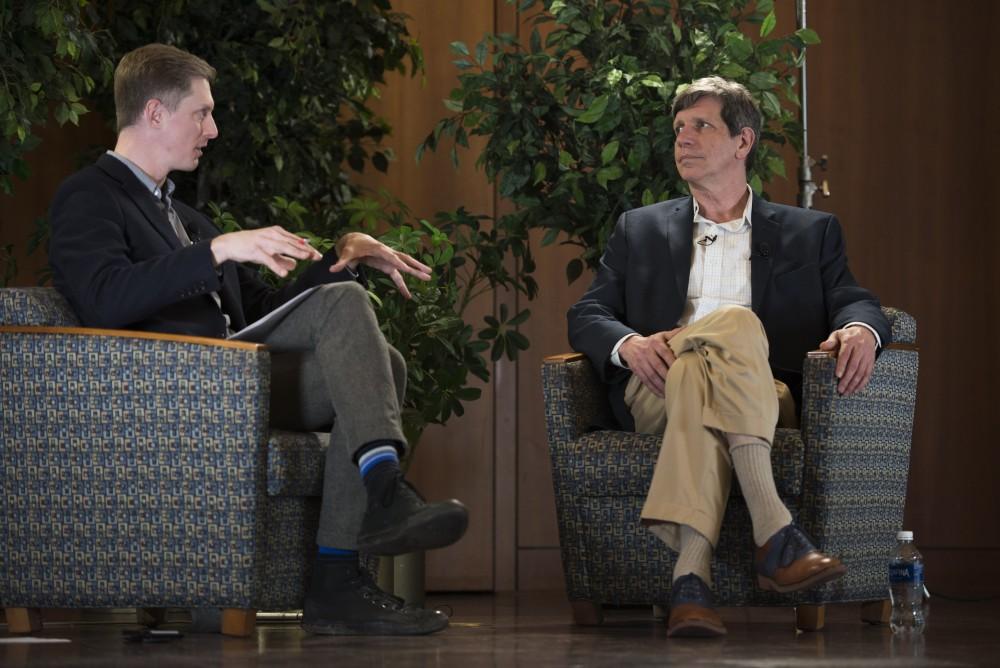Journalist Curt Guyette speaks about Flint water crisis

GVL / Luke Holmes – Curt Guyette sits down to discuss the Flint water crisis with Dr. Eric Harvey. The discussion was held in the Cook-DeWitt Center Tuesday, Mar. 29, 2016.
Mar 31, 2016
It takes a lot for one person to challenge accountability or responsibility. It’s a difficult feat, one that takes a lot of hard work and dedication to the subject.
Due to Curt Guyette’s unrelenting dedication to find the truth, the state, the entire country and the worldwide community are now aware of the Flint water crisis.
On March 29, Guyette visited Grand Valley State University to speak to students, faculty and staff about his experience with reporting and researching the story.
Working with the American Civil Liberties Union, Guyette first published a story about alarmingly high levels of lead in the Flint city water in the spring of 2015. Guyette gave residents test kits in person and got them studied by a lab at Virginia Technological University to prove his point, solidifying the facts he found with hard evidence.
“I was very cautious in the first story as to not be over alarming,” Guyette said. “I wasn’t for sure, but all the warning signs were there.”
Since then, the Flint water crisis has risen to the top of the nation’s attention, prompting national and international coverage, discussion and debate.
Guyette was awarded the Journalist of the Year Award from the Michigan Press Association in recognition of his hard work and watchdog role over the issue when no one else was reporting about it.
At GVSU, Guyette sat down with Eric Harvey, assistant professor of multimedia journalism, to talk about the water crisis and what it was like to break the story.
The discussion started out talking about the emergency manager laws, which Guyette first reported about in July 2014. Guyette said that because emergency managers directly oversee the city of Flint, it’s generally poor black people that are affected by legislation due to white flight. Guyette said racism “is inherently a part of this issue,” and is the reason that the issue went on for so long without being addressed.
Guyette talked about the government failure involved in the Flint water crisis and said that all of the blame falls upon the people who knew about the issue and didn’t take action against it.
“You expect corporations to be cutting corners to protect their shareholders, but government is there to protect us,” he said. “To have your own government poison you and then try to cover up and attack you for trying to tell the truth is … there’s not even a word to describe that.”
Guyette didn’t break the story alone. Throughout his coverage of the crisis, Guyette had the help of a concerned citizen, LeAnne Walters. Walters met with Guyette during the filming of a documentary about the issue and surprised Guyette with how knowledgeable she was about the subject.
“LeAnne was just determined to get to the truth,” he said. “This was a private citizen that took the time to educate herself and lay out the exact problem. (She is) pretty remarkable.”
Guyette also had the help of a professor at Va. Tech., Marc Edwards. Walters helped Guyette learn about the city of Flint and where the leaden water was, while Edwards lead the lab that tested the water samples from Flint.
Guyette took the time to criticize the way the state government handled the crisis, saying that for a long time, officials denied any accusation and attacked any individual that suggested there was a problem.
Through it all, Guyette finds fault in the government and the institutional failures that led for the problem to get as out of control as it did.
“People were poisoned,” he said. “Kids are damaged for life because of this. There were crimes committed and people need to be prosecuted.”
After the discussion, Guyette answered audience questions, which mostly focused on his reporting of the story.
Guyette told attendees that for any type of scrutiny or investigative reporting, evidence and hard facts are the most important things to make any argument rock-solid.
“Whether (you’re) taking on the government or whatever power structure, you don’t want to do anything that’s going damage to your credibility,” Guyette said. “There is no unimportant story, because your credibility rides on every story you write.”























